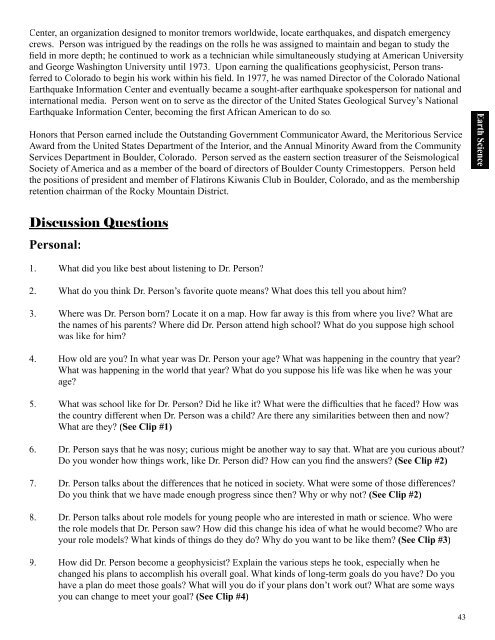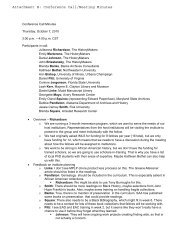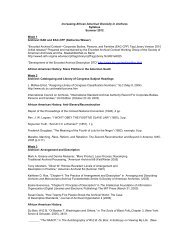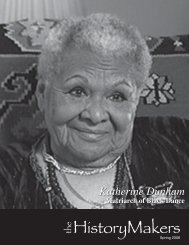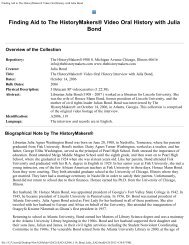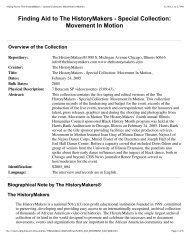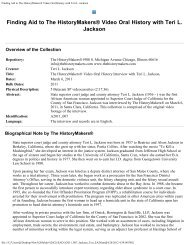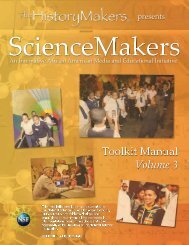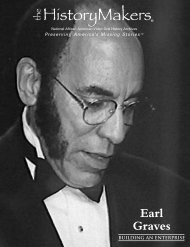ScienceMakers Toolkit Manual - The History Makers
ScienceMakers Toolkit Manual - The History Makers
ScienceMakers Toolkit Manual - The History Makers
Create successful ePaper yourself
Turn your PDF publications into a flip-book with our unique Google optimized e-Paper software.
Center, an organization designed to monitor tremors worldwide, locate earthquakes, and dispatch emergency<br />
crews. Person was intrigued by the readings on the rolls he was assigned to maintain and began to study the<br />
fi eld in more depth; he continued to work as a technician while simultaneously studying at American University<br />
and George Washington University until 1973. Upon earning the qualifi cations geophysicist, Person transferred<br />
to Colorado to begin his work within his fi eld. In 1977, he was named Director of the Colorado National<br />
Earthquake Information Center and eventually became a sought-after earthquake spokesperson for national and<br />
international media. Person went on to serve as the director of the United States Geological Survey’s National<br />
Earthquake Information Center, becoming the fi rst African American to do so.<br />
Honors that Person earned include the Outstanding Government Communicator Award, the Meritorious Service<br />
Award from the United States Department of the Interior, and the Annual Minority Award from the Community<br />
Services Department in Boulder, Colorado. Person served as the eastern section treasurer of the Seismological<br />
Society of America and as a member of the board of directors of Boulder County Crimestoppers. Person held<br />
the positions of president and member of Flatirons Kiwanis Club in Boulder, Colorado, and as the membership<br />
retention chairman of the Rocky Mountain District.<br />
Discussion Questions<br />
Personal:<br />
1. What did you like best about listening to Dr. Person?<br />
2. What do you think Dr. Person’s favorite quote means? What does this tell you about him?<br />
3. Where was Dr. Person born? Locate it on a map. How far away is this from where you live? What are<br />
the names of his parents? Where did Dr. Person attend high school? What do you suppose high school<br />
was like for him?<br />
4. How old are you? In what year was Dr. Person your age? What was happening in the country that year?<br />
What was happening in the world that year? What do you suppose his life was like when he was your<br />
age?<br />
5. What was school like for Dr. Person? Did he like it? What were the diffi culties that he faced? How was<br />
the country different when Dr. Person was a child? Are there any similarities between then and now?<br />
What are they? (See Clip #1)<br />
6. Dr. Person says that he was nosy; curious might be another way to say that. What are you curious about?<br />
Do you wonder how things work, like Dr. Person did? How can you fi nd the answers? (See Clip #2)<br />
7. Dr. Person talks about the differences that he noticed in society. What were some of those differences?<br />
Do you think that we have made enough progress since then? Why or why not? (See Clip #2)<br />
8. Dr. Person talks about role models for young people who are interested in math or science. Who were<br />
the role models that Dr. Person saw? How did this change his idea of what he would become? Who are<br />
your role models? What kinds of things do they do? Why do you want to be like them? (See Clip #3)<br />
9. How did Dr. Person become a geophysicist? Explain the various steps he took, especially when he<br />
changed his plans to accomplish his overall goal. What kinds of long-term goals do you have? Do you<br />
have a plan do meet those goals? What will you do if your plans don’t work out? What are some ways<br />
you can change to meet your goal? (See Clip #4)<br />
43<br />
Earth Science


